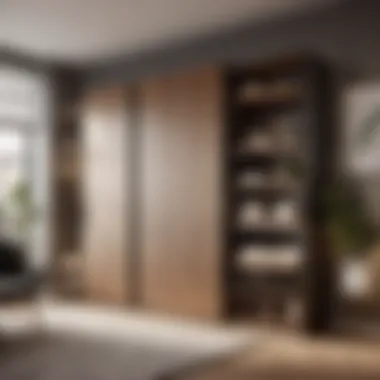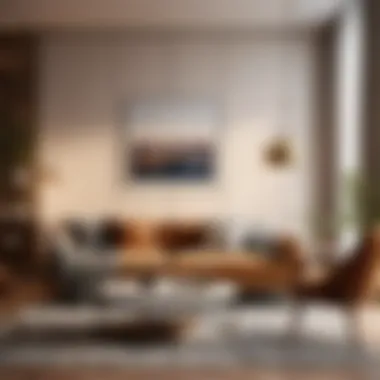Unlocking the Secrets to Perfect Furniture Arrangement in a One-Bedroom Haven


Materials:
- Sofa: 1 piece, dimensions 80" x 35" x 30"
- Coffee Table: 1 piece, dimensions 40" x 24" x 18"
- TV Stand: 1 piece, dimensions 60" x 18" x 20"
- Area Rug: 1 piece, dimensions 8' x 10'
- Floor Lamp: 1 piece, adjustable height
DIY Steps:
- Begin by measuring the dimensions of your apartment space to accurately plan the layout.
- Place the sofa against the longest wall to maximize seating area while leaving enough space for movement.
- Position the coffee table in front of the sofa at a distance that allows easy access to it.
- Place the TV stand across from the sofa, ensuring the TV is at eye level for comfortable viewing.
- Lay the area rug under the sofa and coffee table to anchor the living area.
- Add the floor lamp in a corner to provide ambient lighting.
Technical Aspects:
- Tools needed: Tape measure, level, screwdriver
- Timing specifics: Allocate 3-4 hours for furniture assembly
- Critical techniques: Ensure precise measurements for optimal layout efficiency
DIY Project Process:
- Start by assembling the sofa according to the manufacturer's instructions.
- Use a level to place the coffee table and TV stand evenly on the floor.
- Carefully position the area rug to cover the central living space.
- Adjust the floor lamp's height as needed to light up the room adequately.
Troubleshooting Tips:
- If the sofa blocks natural light, consider using lighter colors to maintain brightness.
- In case of limited space, opt for foldable or multifunctional furniture pieces.
- For a cozier feel, add throw pillows and blankets to the sofa.
Introduction
Understanding the Space
Assessing room dimensions
When it comes to optimizing furniture layout in a one-bedroom apartment, assessing the room dimensions is crucial. Understanding the size and shape of each room allows you to make informed decisions about furniture placement and size. By taking accurate measurements and considering factors such as ceiling height and architectural quirks, you can maximize the use of every square inch in your apartment. Assessing room dimensions also helps in determining the ideal furniture scale and proportions for a cohesive look.
Evaluating natural light sources
Natural light can significantly impact the ambiance of a space, making it essential to evaluate the natural light sources in your apartment. By understanding how light enters each room throughout the day, you can make informed decisions about furniture placement to maximize both natural light and artificial lighting options. Evaluating natural light sources also contributes to creating a harmonious and inviting atmosphere that enhances the overall aesthetic of your living space.
Setting Design Goals
Creating a cohesive aesthetic
One of the key design goals when optimizing furniture layout is to create a cohesive aesthetic throughout your one-bedroom apartment. This involves selecting furniture pieces that complement each other in style, color, and texture. By choosing cohesive furniture pieces, you can enhance the visual flow of your space and create a harmonious environment that feels unified and intentional. Creating a cohesive aesthetic not only elevates the overall look of your apartment but also contributes to a sense of calm and balance.
Prioritizing functionality
In addition to aesthetics, prioritizing functionality is paramount when optimizing furniture layout. Functional furniture choices can help maximize space efficiency and improve the usability of each room in your one-bedroom apartment. By focusing on furniture that serves a dual purpose or offers storage solutions, you can create a practical living space that meets your everyday needs. Prioritizing functionality ensures that your furniture layout is not only beautiful but also enhances your daily living experience.
Key Considerations
Furniture scale and proportions


One of the key considerations in optimizing furniture layout is furniture scale and proportions. Choosing the right size and scale of furniture pieces is essential for creating a balanced and visually pleasing arrangement. By considering the proportions of each piece in relation to the room size, you can prevent overcrowding or awkward empty spaces. Furniture scale and proportions play a significant role in defining the overall look and feel of your one-bedroom apartment, contributing to a sense of harmony and elegance.
Traffic flow
Another important aspect to consider is traffic flow within your apartment. Ensuring clear pathways and easy navigation through each room is essential for creating a functional and practical living space. By strategically placing furniture to allow for smooth movement and accessibility, you can improve the flow and usability of your apartment. Considering traffic flow also helps in optimizing the arrangement of furniture to enhance social interactions and activities, making your one-bedroom apartment a more inviting and comfortable space for everyday living.
Living Room Layout
Choosing the Right Sofa
Sectional vs. Loveseat
When delving into the decision of selecting the ideal sofa for a one-bedroom apartment, the choice between a sectional and a loveseat plays a pivotal role. Sectionals, with their L-shaped design and generous seating capacity, are well-suited for larger living rooms or for those who frequently host gatherings. On the other hand, loveseats offer a more compact seating option that can be versatile in smaller spaces, allowing for easier mobility and flexibility in configuration. Each option presents its own set of advantages and considerations, making it essential to assess the available space and intended use to determine which aligns best with the overall objectives of the room's layout.
Optimal Placement
Optimal placement of the sofa within the living room layout is crucial for creating a harmonious and functional environment. The positioning of the sofa not only impacts the flow of the room but also influences the focal point and overall balance of the space. Placing the sofa against a wall can help maximize floor space and create a cozy nook, while centering it in the room can establish a more open and inviting atmosphere. By considering factors such as traffic flow, natural light, and the relationship with other furniture pieces, homeowners can achieve a layout that promotes comfort, accessibility, and visual appeal.
Coffee Table and Side Tables
When it comes to furnishing the living room, the selection of a coffee table and side tables plays a vital role in enhancing both functionality and style. These pieces not only serve as practical surfaces for placing drinks, decor, and essentials but also contribute to the overall aesthetic of the room. Balancing functionality and style is key in choosing the right pieces, ensuring that they complement the seating arrangement and the room's design theme. Additionally, maintaining proper proportions between the coffee table and side tables is essential to prevent overcrowding or imbalance in the space. By carefully selecting these pieces based on their functionality, style, and proportionate relationship to the surrounding furniture, homeowners can create a cohesive and visually pleasing living room layout.
Functionality and Style
When considering the coffee table and side tables for the living room, the balance between functionality and style is paramount. The coffee table should offer sufficient surface area for serving snacks and beverages, while also incorporating storage options to declutter the space. Similarly, side tables should provide convenient spots for lamps, books, or personal items, contributing to the overall comfort and usability of the room. Selecting pieces that align with the design aesthetic of the room, whether contemporary, traditional, or eclectic, is essential in creating a cohesive and harmonious living room layout.
Balancing Proportions
Maintaining balanced proportions when choosing the coffee table and side tables is key to achieving a polished and well-rounded look in the living room. Oversized or undersized furniture can disrupt the visual harmony of the space, making it essential to consider the scale of the room and the surrounding furniture pieces. The coffee table should strike a harmonious balance with the sofa, providing ample functionality without overpowering the seating area. Similarly, side tables should complement the seating arrangement while offering sufficient surface space without appearing disproportionate. By ensuring that the proportions of these pieces are aligned with the dimensions of the room and the other furniture elements, homeowners can create a visually appealing and carefully curated living room layout.
Entertainment Setup
The entertainment setup in the living room plays a significant role in enhancing the functionality and enjoyment of the space. From the placement of the TV to incorporating storage solutions for electronics and media, designing an efficient and stylish entertainment area is essential. By considering factors such as viewing angles, wiring accessibility, and visual impact, homeowners can create a setup that integrates seamlessly with the overall living room layout.
TV Placement
The placement of the TV within the living room layout influences the overall aesthetic and functionality of the space. Whether mounted on the wall or placed on a stand, the TV's positioning should be optimized for comfortable viewing and minimal light glare. Additionally, integrating the TV into the room's design scheme, either as a focal point or discreetly concealed within a media console, enhances the visual cohesiveness of the space. By strategically placing the TV based on seating arrangements, room dimensions, and personal viewing preferences, homeowners can create an entertainment setup that merges seamlessly with the living room layout.
Storage Solutions
Incorporating effective storage solutions within the entertainment area is essential for keeping the living room organized and clutter-free. From media consoles with ample shelf space to built-in cabinets that conceal wires and electronics, choosing the right storage options can enhance both the functionality and aesthetic appeal of the room. By selecting furniture pieces that offer a blend of storage capacity and style, homeowners can seamlessly integrate technology and media components into the living room layout while maintaining a streamlined and inviting atmosphere.
Accent Pieces
Accent pieces such as rugs, throws, and decorative elements play a crucial role in adding personality and style to the living room layout. These accessories not only enhance the visual appeal of the space but also contribute to its overall ambiance and comfort. By carefully selecting accent pieces that complement the room's color scheme, texture, and theme, homeowners can inject character and depth into their living environment.
Rugs and Throws


Rugs and throws are versatile accent pieces that can define seating areas, add warmth, and introduce pops of color and texture to the living room. Whether layered under furniture, draped over a sofa, or positioned as a focal point, rugs and throws offer both aesthetic and functional value. Choosing textures, patterns, and sizes that harmonize with the existing decor can elevate the room's design and create a cozy and inviting atmosphere.
Decorative Elements
Decorative elements such as artwork, vases, and decorative cushions bring personality and style to the living room layout. These accents serve as finishing touches that tie together the design scheme and reflect the homeowner's individual taste and preferences. By strategically placing decorative elements throughout the room, homeowners can infuse charm, sophistication, and visual interest into the space. Selecting pieces that resonate with the overall theme and color palette of the room ensures a cohesive and well-curated living room layout, where every element contributes to the overall aesthetic impact and livability of the space.
Bedroom Arrangement
Creating a well-thought-out bedroom arrangement is a vital aspect of optimizing your one-bedroom apartment's living space. The bedroom serves as a sanctuary for rest and relaxation, making it essential to strike a balance between functionality and comfort. How you position key elements within the bedroom can significantly impact both the visual appeal and practicality of the space. By carefully considering aspects such as bed placement, closet organization, and furniture selection, you can transform your bedroom into a haven of serenity.
Bed Placement
Bed placement plays a crucial role in the overall layout and functionality of the bedroom. The orientation of the bed sets the tone for the room's aesthetic and influences the flow of the space. Whether you opt for a traditional headboard orientation against a wall or a more unconventional placement, it is essential to consider factors such as natural light sources and traffic flow to ensure a cohesive design. The right bed placement can create a sense of balance and harmony within the room, enhancing your overall living experience.
- Headboard Orientation: The headboard orientation of the bed is a critical design choice that can impact the room's visual appeal and usability. Placing the headboard against a focal wall can create a sense of symmetry and provide a designated sleeping area. This configuration is a popular choice for maximizing space efficiency while also allowing for easy access to nightstands and other bedroom essentials.
- Nightstand Selection: Choosing the right nightstand is essential for complementing the bed frame and enhancing the functionality of the bedroom. Nightstands offer convenient storage solutions for essentials such as books, lamps, and nighttime essentials. Opting for nightstands that mirror the design aesthetic of the bed can create a cohesive look while maximizing the available space in the room.
Closet Organization
Efficient closet organization is essential for maximizing storage space and streamlining your daily routine. A well-organized closet can help you easily locate items, minimize clutter, and optimize the use of space. By leveraging vertical storage solutions and smart organization tactics, you can transform your closet into a functional and stylish space that enhances the overall bedroom arrangement.
- Maximizing Storage Space: Utilizing every inch of closet space is crucial for optimizing storage capacity in a one-bedroom apartment. Install shelving units, hanging organizers, and storage bins to maximize vertical space and create designated storage zones for different clothing items. Incorporating pull-out drawers and shoe racks can further enhance the closet's functionality and accessibility.
- Utilizing Vertical Storage: Vertical storage solutions, such as hanging shelves and cascading organizers, are excellent space-saving strategies for small bedrooms. By capitalizing on the vertical height of the closet, you can store seasonal clothing, accessories, and shoes without occupying valuable floor space. Implementing a mix of hanging rods and shelves can ensure that every inch of the closet is utilized efficiently.
Dresser and Vanity
The dresser and vanity area serve as essential components of the bedroom arrangement, offering both storage functionality and aesthetic appeal. A well-designed dresser layout can provide ample storage space for clothing and accessories while also serving as a decorative element in the room. Similarly, a carefully curated vanity setup can enhance your daily grooming routine and add a touch of luxury to the bedroom environment.
- Functional Layout: When designing the dresser layout, consider factors such as drawer organization, compartmentalization, and accessibility. Opt for a dresser size that fits comfortably within the available space without overwhelming the room. Choose a vanity design that complements the overall bedroom aesthetic and offers adequate lighting for grooming tasks. Incorporate mirrors, vanity trays, and storage containers to create a functional and visually appealing grooming area.
- Lighting Considerations: Proper lighting is essential in the dresser and vanity area to ensure optimal visibility and functionality. Install task lighting such as wall sconces or vanity lights to illuminate the space effectively. Consider incorporating dimmable lighting options to create ambient atmosphere for grooming routines. Placement of lighting fixtures should be strategic to minimize shadows and enhance functionality in the dressing and grooming areas.
Dining Area Configuration
Table Shape and Size
Round vs. rectangular
When it comes to choosing between a round or rectangular dining table, each shape offers distinct advantages based on the desired atmosphere and functional requirements of the space. A circular dining table tends to promote a cozy and intimate dining experience, facilitating easy conversation among individuals seated around it. In contrast, a rectangular table is ideal for maximizing seating capacity and accommodating larger groups comfortably. Both shapes have their unique features and benefits, allowing for personal preference and the layout of the dining area to dictate the most suitable choice for the apartment.
Seating capacity
Determining the appropriate seating capacity for the dining area is crucial to ensure that the space can accommodate gatherings of various sizes. The number of chairs that can fit around the table comfortably influences the functionality and usability of the dining area. Depending on the apartment's size and the frequency of hosting guests, the seating capacity should strike a balance between providing ample space for diners and preventing overcrowding. By considering the available space and the anticipated usage of the dining area, homeowners can select the optimal seating capacity to enhance both comfort and functionality within their apartment.
Chair Selection
Selecting the right dining chairs involves considering both ergonomics and comfort to promote enjoyable mealtimes and encourage extended social engagements at the table. Ergonomically designed chairs provide proper support to diners, promoting good posture and reducing discomfort during extended periods of use. Additionally, prioritizing comfort in chair selection ensures that individuals can relax and fully enjoy their dining experience in the apartment.
Ergonomics and comfort


When focusing on ergonomics and comfort in chair selection, homeowners can prioritize factors such as lumbar support, seat padding, and backrest design to enhance the overall dining experience. Choosing chairs that offer ergonomic benefits can contribute to improved posture and greater comfort, ensuring that residents and guests can dine comfortably for extended periods.
Visual impact
Beyond functionality, the visual impact of dining chairs significantly influences the aesthetic appeal of the dining area. Chairs with stylish designs and complementary textures can elevate the overall look of the apartment, creating a harmonious dining space that reflects the homeowner's taste and style preferences. By selecting dining chairs that not only prioritize comfort but also enhance the visual appeal of the dining area, homeowners can achieve a balanced and inviting atmosphere for shared meals.
Storage Solutions
Integrating storage solutions into the dining area configuration enables homeowners to maximize space efficiency while maintaining an organized and clutter-free environment. By carefully selecting furniture pieces that offer storage functionality, such as buffets or sideboards, residents can optimize the usability of the dining area and enhance its overall functionality.
Buffet or sideboard
The inclusion of a buffet or sideboard in the dining area provides a practical storage solution for dinnerware, linens, and other dining essentials. These furniture pieces offer both functional storage space and decorative opportunities, allowing homeowners to showcase personal style through curated displays while keeping dining necessities easily accessible. Additionally, a buffet or sideboard contributes to the cohesive design of the dining area, creating a seamless transition between aesthetics and functionality within the apartment.
Vertical storage options
Utilizing vertical storage options in the dining area maximizes space efficiency and enhances organizational capabilities within the apartment. By incorporating features such as wall-mounted shelves or hanging planters, homeowners can optimize vertical space utilization while adding visual interest to the dining area. Vertical storage solutions not only help free up floor space but also contribute to a streamlined and clutter-free environment, fostering a sense of openness and tranquility in the dining area.
Maximizing Multifunctional Spaces
Maximizing multifunctional spaces in a one-bedroom apartment is crucial for optimizing the overall layout and functionality of the living space. By integrating versatile furniture pieces and smart design solutions, residents can make the most out of limited square footage without compromising on comfort or style. This section delves into key principles and elements that contribute to creating adaptable areas that serve multiple purposes seamlessly.
Convertible Furniture
Sleeper Sofas
Sleeper sofas play a pivotal role in maximizing multifunctional spaces by offering a practical blend of seating and sleeping accommodation. Their versatile nature allows for easy transformation from a cozy seating area during the day to a comfortable bed at night, making them an ideal choice for compact living environments. The key characteristic of sleeper sofas is their dual functionality, serving as a space-saving solution that enhances both the aesthetic and practical aspects of the room. One unique feature of sleeper sofas is their ability to cater to overnight guests without the need for a separate guest room, maximizing the apartment's usability. While they offer convenience and flexibility, it's essential to consider the size and style to ensure they complement the overall design seamlessly.
Storage Ottomans
Storage ottomans are another ingenious addition to a one-bedroom apartment seeking to optimize space efficiency. These multifunctional pieces serve as both a seating option and a discreet storage solution. The key characteristic of storage ottomans lies in their ability to declutter the living area by providing a hidden compartment for storing various items, such as throws, cushions, or magazines. Their dual-purpose design makes them a popular choice in modern households looking to merge practicality with aesthetics seamlessly. However, while their advantages include versatility and organization, the limited storage capacity may require strategic planning to make the most of this furniture piece within the apartment setup.
Utilizing Vertical Space
Wall-Mounted Shelves
Wall-mounted shelves offer an efficient way to utilize vertical space effectively, especially in rooms with limited floor area. By installing shelves on walls, homeowners can free up valuable ground space while adding storage and display options. The key characteristic of wall-mounted shelves is their ability to create a visual focal point and optimize storage without compromising on the room's aesthetic appeal. Their popularity stems from the versatility they offer in showcasing decor items, books, or personal belongings, thereby enhancing the room's functionality. One unique feature of wall-mounted shelves is their customization potential, allowing residents to adjust shelf heights and configurations to suit their specific needs. However, it's essential to consider weight-bearing capacities and proper installation to ensure safety and durability.
Hanging Planters
Hanging planters serve as a dual-purpose element in a one-bedroom apartment, combining greenery with space-saving capabilities. These elevated plant containers add a touch of nature to the living space while utilizing vertical space effectively. The key characteristic of hanging planters is their ability to bring the outdoors inside, transforming dull walls or corners into vibrant, lush displays. Their popularity lies in their decorative appeal and the benefits of improving indoor air quality and promoting a sense of well-being. One unique feature of hanging planters is their versatility in accommodating a variety of plant species, from cascading vines to fragrant herbs, enhancing the apartment's ambiance. However, considerations such as adequate sunlight exposure and maintenance requirements need attention to ensure the plants thrive in indoor settings.
Flexible Partitioning
Room Dividers
Room dividers are essential in creating distinct zones within a one-bedroom apartment without the need for permanent walls. These versatile partitions offer privacy, define spaces, and add a decorative touch to the overall layout. The key characteristic of room dividers is their ability to segregate areas while maintaining an open feel, ideal for maximizing multifunctional spaces. Their popularity stems from the flexibility they provide in adapting to changing needs, whether dividing a living room from a dining area or creating a makeshift home office. One unique feature of room dividers is their aesthetic appeal, as they come in various styles, materials, and designs to complement different interior themes. However, it's crucial to consider the room's dimensions and layout when selecting room dividers to ensure they blend harmoniously with the existing decor.
Sliding Doors
Sliding doors offer a practical solution for flexible partitioning in a one-bedroom apartment, enabling residents to adjust space configurations effortlessly. These sleek and space-saving doors slide along tracks, eliminating the need for swing clearance, making them ideal for compact living environments. The key characteristic of sliding doors is their seamless functionality and modern aesthetic appeal, creating a contemporary touch to the apartment's design. Their popularity lies in enhancing privacy while optimizing floor space, especially in rooms where traditional doors may not be feasible due to space constraints. One unique feature of sliding doors is their versatility, as they come in various materials, finishes, and styles to complement different interior preferences. However, proper installation and maintenance are essential to ensure smooth operation and longevity of sliding doors.
This detailed exploration of convertible furniture, vertical space utilization, and flexible partitioning underscores the significance of maximizing multifunctional spaces in a one-bedroom apartment. By incorporating these elements thoughtfully, residents can create a versatile and aesthetically pleasing living environment that adapts to their lifestyle needs.







